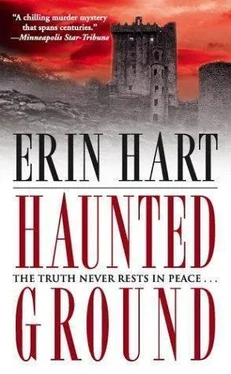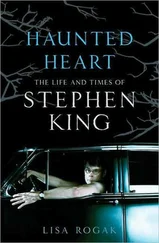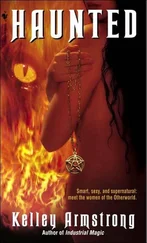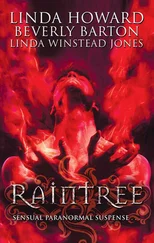Jeremy Osborne’s face was filled with revulsion, but his strength was gone and he could not pull his hand away from his mother’s grasp. Lucy continued, her voice now absolutely cool and deliberate: “And then I thought how fitting it was, in a way, because of all the people who had tried to take Jeremy away from me, it was this child, this filthy little kaffir, who’d most nearly succeeded. I said to him, ‘It’s really for the best, don’t you see? There’s nothing left for you here, you poor, motherless mongrel.’ What I did was an act of kindness.”
Devaney pictured the boy arriving back with the shovel, to find his mother’s hand covering Christopher’s face. “Is that how it happened, Jeremy?” he asked.
“I don’t know. I don’t know.” The boy’s face was twisted with anguish. Here was the real reason Jeremy had not come forward, though he had nearly died trying to keep that terrible truth within himself. It had been too late to do anything for Mina, but Jeremy had suffered torture for more than two harrowing years, thinking that he might have saved Christopher.
But Lucy wasn’t finished. “After that, there was only Hugh, and he was so bloody weak—like all the Osbornes. He let himself be convinced—under the circumstances—that the estate ought to go to Jeremy if anything happened to him. That’s what he told me Sunday evening, that he’d gone to London to change his will. He even believed that it was his own idea all along.”
Lucy Osborne’s eyes grew larger, and the words came faster and faster, spilling out in an unstoppable torrent: “I knew no one would question a suicide, the way he’d carried on. It was almost too easy, putting the sleeping tablets in his tea. I knew the real difficulty would be in getting him out to the car, but the garden cart worked very handsomely. But that meddling pair ruined everything. That wretched American, prying into every corner, using Jeremy to get at me. I tried to warn her off, get rid of her—I told her on the phone, leave it alone, they’re better off. The broken glass was far too subtle; she just swept it up. Finally, I put that horrible dead thing in her bed, but she still wouldn’t leave us alone. That’s why it had to escalate, why Hugh’s suicide had to happen that night, when they were supposed to be out for the evening. And if only—” The memory of this failure seemed to cause physical pain, and Lucy Osborne’s bony fingers clawed at the bedsheets like talons. Her eyes brimmed with hatred and disgust. “If only they’d arrived five minutes later, Jeremy and I would be shut of this godforsaken country and on our way home again. And none of you could have stopped us.”
Devaney had heard his share of confessions. He’d seen plenty of suspects finally crack under the pressure of questioning. But he had never witnessed anything quite like what had just taken place here.
Lucy’s face softened again as she turned to her son and took his hand. “This is not your fault, darling. You did so well for so long. I know it was difficult. Whatever happens to me, you mustn’t blame yourself.” With gritted teeth, Jeremy wrested his hand from his mother’s grip, and turned away from her, wracked with broken sobs. Devaney wasn’t sure the woman realized that her son had been lost to her quite some time ago.
“Lucy Osborne, I’m arresting you for the murder of Christopher Osborne, for the attempted murder of Hugh Osborne, and for concealing evidence in the death of Mina Osborne. It would be in your best interest to speak with your solicitor as soon as possible. You can phone from the station. Do you understand? Mrs. Osborne?”
Lucy ignored him, and reached out to stroke her son’s hair. “You haven’t been well, my love. Not well at all. You rest now, darling. I’ll be back soon.”
Not for about thirty years, Devaney thought. “I’d be obliged if you and Mullins would take Mrs. Osborne to the station,” he said to O’Byrne. “I’ll be there shortly—there’s something I have to do first.”
Devaney was crossing Drumcleggan Bog when he saw Hugh Osborne’s black Volvo heading toward him. He leaned on the horn; though Osborne had been driving fast, he managed to slow down and stop, then reversed until the two cars were side by side.
“I had a message about Jeremy. Is he all right? What did he say?”
Devaney looked into the man’s eyes and felt the words tearing at his throat as he tried to speak. Maybe it would be better if there were other people around. “Hadn’t we better go somewhere it’s easier to talk?”
“Tell me now, Detective. Please. There’s a place where you can pull off the road just ahead. I’ll turn around.”
Devaney nodded once, and drove off the road to the place Osborne had mentioned, a small peninsula of solid ground that jutted out into the bog. He looked through the wind-screen at the black voids of the random cut-aways and the little clumps of footed turf as the first drops of rain began to spit from the low, shifting blanket of clouds that moved in from the west. And he knew that Hugh Osborne had been telling the truth all along. That ridiculous story about stopping to rest along the road from Shannon was not fiction but cruel fact. It meant that Osborne would have to live the rest of his life knowing he’d been asleep only a few miles from home as his wife and son were killed. Devaney thought as he opened the car door and felt the freshness of the mist on his face how strange it was that this chapter of the story at least would reach its end here in the bog, almost exactly where it had begun. And it struck him that there was nowhere to hide in this place of banishment—neither tree nor stone nor bush as far as the eye could see, nothing to provide shelter from the wind, and from the rain when it came.
Alone in her room, Nora counted the time: it was nine days now after the tower fire, and just a week since the discovery of the souterrain. Cormac’s work at the priory was finished, and they would be leaving Bracklyn House after the funeral tomorrow. They were alone in the house at the moment; Hugh Osborne had looked exhausted this morning, but he’d insisted on driving on his own to collect his mother-in-law at Shannon, and they hadn’t been able to dissuade him.
She found Cormac in his room, packing for the journey. “I just spoke to Hickey, the garage man,” she said, sitting on the bed where he was arranging the items in his case. “My car’s good as new, but they couldn’t get all the parts for yours. Drivable, he says, but you’ll have to get the rear window replaced when you get back to Dublin.”
“I was actually thinking I might not go straight home,” Cormac said. He paused a moment before continuing. “I was thinking of heading up to Donegal for a few days.” He hesitated once more, but this time looked up at her. “You could come with me.”
This sudden fit of spontaneity took Nora completely by surprise. She studied his face for a moment before responding. “I have to get back to Dublin; I’ve already missed a week of classes as it is. You’re probably better off on your own, anyway. I imagine you and your father will find plenty to talk about. How’s your head, though? Are you sure you’re all right for driving?”
“I’ll be fine.” Cormac shoved his case aside and sat down beside her, then reached for her hand, and pressed his lips to the inside of her wrist.
She tried to withdraw her hand. “I’m going to be kicking myself as it is, but you have to bloody well make sure of it, don’t you?”
“Nora, what’s bothering you?”
“I was so wrong about Hugh. I heard what I wanted to hear, and I came here ready to hang him. The worst part is that he’s been so forgiving.”
“It wasn’t just you; everyone suspected him. The police—”
Читать дальше











